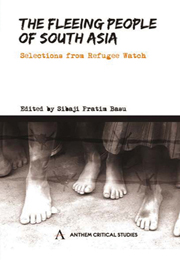Book contents
- Frontmatter
- Contents
- Acronyms and Abbreviations
- Foreword by Ranabir Samaddar
- Preface
- ETHICAL ISSUES
- LAWS
- SOUTH ASIA
- INDIA
- GENDER
- INTERVIEW/CORRESPONDENCE
- REPRESENTATIONS
- Introduction
- Creativity's Mirror
- Writing Displacement: Creativity and Objectivity
- Boundaries, Borders and Bodies
- Forced Displacement and Identity Formation in the EU
- The Changing Scales of Good and Evil: Morality Plays at the Profiled EU and US Borders
- Index
Writing Displacement: Creativity and Objectivity
from REPRESENTATIONS
Published online by Cambridge University Press: 05 March 2012
- Frontmatter
- Contents
- Acronyms and Abbreviations
- Foreword by Ranabir Samaddar
- Preface
- ETHICAL ISSUES
- LAWS
- SOUTH ASIA
- INDIA
- GENDER
- INTERVIEW/CORRESPONDENCE
- REPRESENTATIONS
- Introduction
- Creativity's Mirror
- Writing Displacement: Creativity and Objectivity
- Boundaries, Borders and Bodies
- Forced Displacement and Identity Formation in the EU
- The Changing Scales of Good and Evil: Morality Plays at the Profiled EU and US Borders
- Index
Summary
The media has been variously defined as a public sphere providing space for issues of importance to be discussed and debated; a major collective source of information and images, which is essential for citizen participation; a network providing a crucial link between individuals and ‘the collective’, which is society. Its power stems from its ownership of the power to interpret, reproduce and disseminate information. It is a power that arises from the social recognition that all human beings have the right to information and the freedom of expression.
Having said this, let us look at this resource a little more closely. The fact that it has often proved unequal to the task it is expected to do is to state the obvious: its silences often being as significant as its statements. It would be useful to ask ourselves, then, why this happens. Well, society as we know it is a terrain in which various discourses, reflecting the interests of discrete groups, are constantly competing with each other for supremacy. While some of these get to the top of the heap, the rest are marginalized, and often forgotten. The newspapers we read, the television we watch, the internet we scan, contributes in no small measure to this process. But, that's not all. The media, even as they attempt to reflect social and political events occurring around us, are themselves sites where contending ideologies and viewpoints do battle. But there is a further complication to consider.
- Type
- Chapter
- Information
- The Fleeing People of South AsiaSelections from Refugee Watch, pp. 407 - 412Publisher: Anthem PressPrint publication year: 2009

